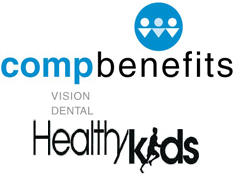 |
|
GETTING STARTED Identification Card You will be issued an identification card upon enrollment in your plan. The card identifies you as a CompBenefits member. If your card is lost or stolen, call Member Services to get a new card mailed to you. Making An Appointment When you need dental care, simply call your participating general dentist's office to make an appointment. When you call, make sure you have your ID card handy, in case you are asked questions regarding your dental plan. Orthodontics Orthodontics (Braces) are a covered benefit under the Healthy Kids program only when medically necessary. Please reference the Schedule of Benefits for a complete listing of the required medical conditions to qualify for orthodontic coverage. In order to qualify for this coverage, your general dentist must refer the case to CompBenefits for initial review. If an Orthodontist consultation is approved, you will be referred to a Participating Orthodontist. The Orthodontist will render a consultation, and submit his findings along with records and models to the CompBenefits Orthodontic Consultant for final approval. Orthodontic coverage, along with all other coverage, is subject to the $1,000 annual maximum benefit limitation each benefit year. The cost of any procedure, including orthodontics, received in a benefit year above the $1,000 annual maximum benefit will be the member's responsibility. Members who do not qualify for the Healthy Kids orthodontic benefit can receive a 25% discount from participating orthodontist's usual fees by identifying themselves as a Healthy Kids member and showing their Healthy Kids ID card to a participating orthodontist. The discounted benefit will not count against your $1,000 annual benefit maximum. Plan Ahead For Preventive Care If you are a new patient to the dentist you have selected, please contact the office to discuss the necessary procedures for transferring your records from a previous office. Your dentist may want to see you for an initial examination or consultation. You may be rescheduled to begin preventive care or other needed treatment. Two visits allow the dentist to do a thorough assessment and develop a plan of care for you before any treatment is started. This also helps the dentist to stay on time with appointments, in turn keeping you from having a long wait in the office. Specialty Care You may be referred by your participating general dentist to a participating specialty dentist (i.e. endodontist, orthodontist, oral surgeon, periodontist, prosthodontist, or pediatric dentist). Second Opinions Both you and your dentist decide on your course of treatment. If you are not satisfied with your participating general dentist's treatment plan, we encourage you to solicit a second opinion from another participating dentist.
|
||||||||||||||||||||||||||||||||||||||||||
|
© Copyright CompBenefits 2008. |